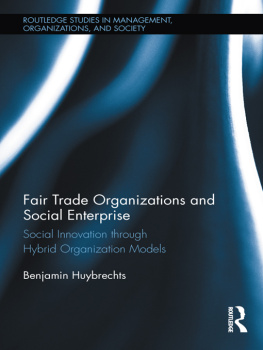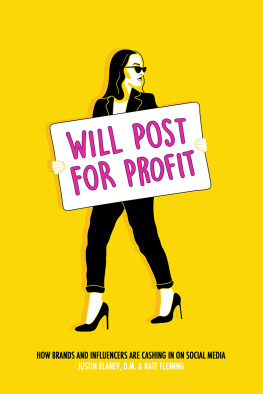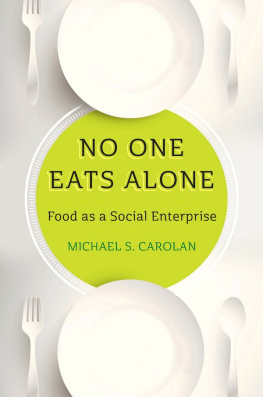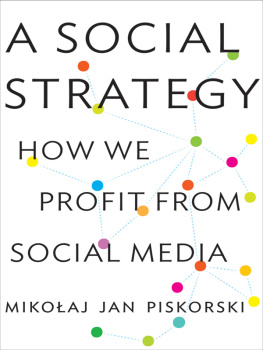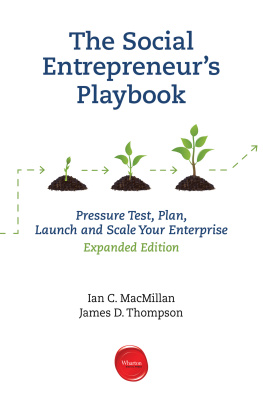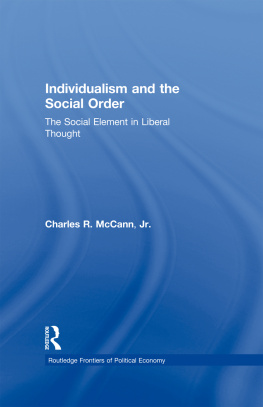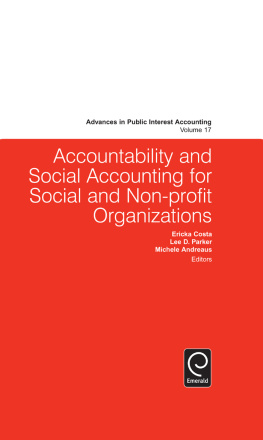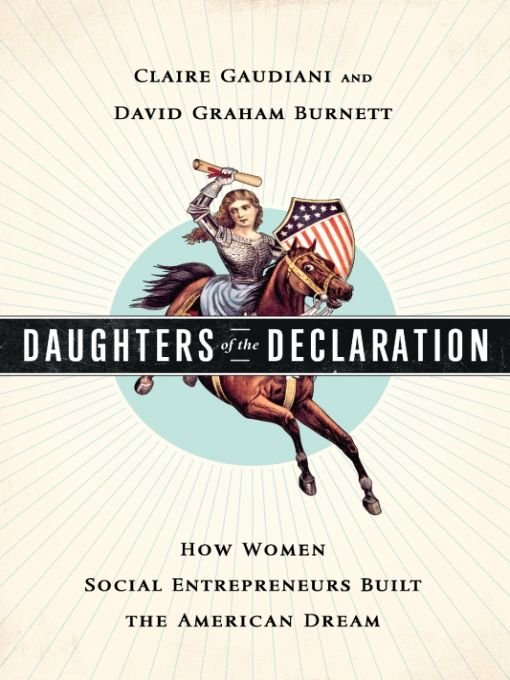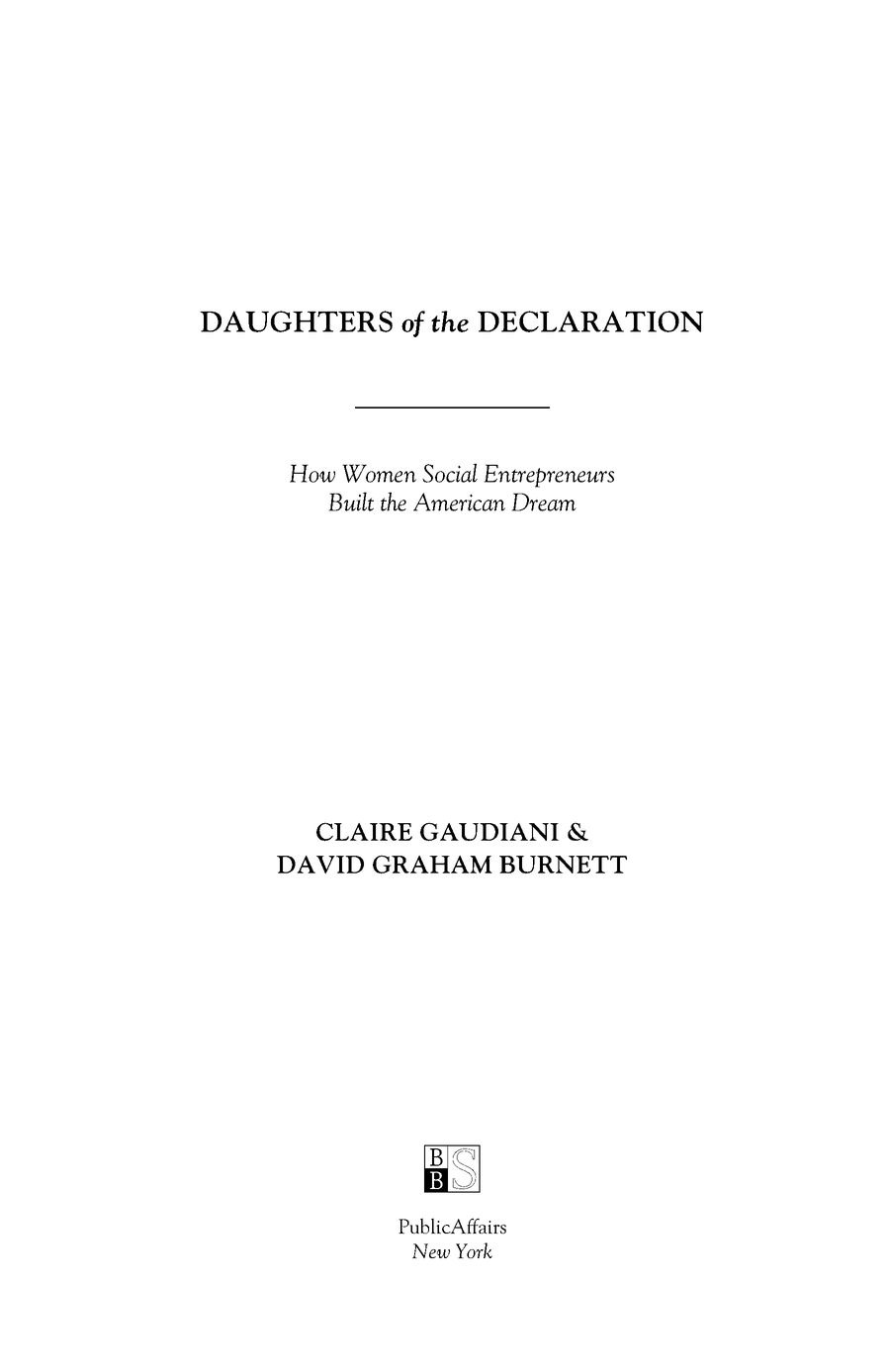Table of Contents
PRAISE FOR DAUGHTERSof theDECLARATION
Claire and David have written a remarkable book that brings to life the unsung early heroes in American philanthropy who happen to be women. Each story brings to life a fearless, entrepreneurial woman whose creativity, focus and perseverance ben-efitted the American social sector in immeasurable ways. Without a doubt, these women laid the cornerstones for American fundraising, public, private and government partnerships, and even micro credit.Eileen R. Heisman. President/CEO, National Philanthropic Trust
We all stand on the shoulders of those who have come before us. Claire and Davids book honors our sisters who have preceded us. Their examples, their spirit and their history still inspire modern day women to be this generations daughters of the declaration. It is a timely and powerful living legacy. A must-read!
Colleen S. Willoughby, Founder, Washington Womens Foundation, Seattle
This engaging book establishes the prominent role that women have long played in the great breakthroughs that have shaped American history. It offers a broad definition of social change that reminds all of us that the daughters of the declaration are still alive in their work today. Thats a very good thing.Paul C. Light, Professor of public service at NYUs Robert F. Wagner School of Public Service and author of Driving Social Change
Daughters of the Declaration is a gift to this nation and the world about the role of women in American civil society. The untold stories of countless social entrepreneurs are now available to inspire future generations of female leaders from all walks of life. Claire and David provide such an intimate and compelling historical accountanyone who reads this book will feel personally connected to the women behind important social movements. What a beautifuland neededbook!Susan Taylor Batten, President & CEO Association of Black Foundation Executives (ABFE)
With great love and admiration
To our mothers,
Olive Burnett and Vera Gaudiani,
and our mothers mothers,
Annie Wagner Graham and Rosa Cosenza Rossano,
Who were each benevolent and even sometimes entrepreneurial
republican mothers,
in gratitude, especially for the virtues they taught.
If opinion and manners did not forbid us to march to glory by the same paths as the Men, we should at least equal and sometimes surpass them in our love of the public good.
Esther Reed, The Sentiments of an American Woman, 1780
INTRODUCTION
This is a book about how America became successful. Our nation is built on three interdependent sectors: the governmental sector, the private or for-profit sector, and the voluntary or not-for-profit sector. None of these existed when the Declaration of Independence was written. All three sectors have been created by the work of American citizens. This three-part system is a unique American asset. We believe that the synergy of these sectors is responsible for our record of social, scientific, economic, and political success over our nations 350-year history.
Daughters of the Declaration focuses on the development of the not-for-profit sector and on the citizens who created it. There are many democratic governments and market-driven economies around the world, but Americans have invented a unique third sector that mobilizes citizen idealism and responsibility. It provides a marketplace where buyers and sellers of ideas to improve the nation (and the world) can meet and do business. Millions of organizations offer their ideas for making the world a better place in which to live. Some of these organizations are quite largeuniversities, mega-churches, and medical research institutesbut most are small and local, for example, soup kitchens, county museums, animal welfare groups, park conservancies, and health clinics, to name but a few. They are all sellers of ideas, competing for investments of money and time by volunteer donors.
All investors in this marketplace, in turn, hope for a return on their investments. Their returns are not measured in personal financial gains, but in what we call social profit, that is, improvements in the collective well-being of our communities and our nation. Some cases of social profit are obvious. We all benefit when researchers supported by voluntary contributions discover a cure for a debilitating disease or a way to improve our food supply. All members of a community benefit when they raise enough money to build a community center that everyone can use. But we, the people also profit from educating all children of all citizens to their highest potential. Who knows which one may produce the next great job-creating business idea or medical breakthrough? We profit collectively when any citizen in need is helped to regain his or her self-reliance and optimism about the future. Cynicism is democracys greatest enemy, and any loss of hope for the future is a loss to our collective well-being. Daughters of the Declaration recounts the stories of some of Americas greatest ideas for the generation of social profit and the entrepreneurs who delivered their value for all of us.
Many Americans (and most foreigners) believe that famous capitalists created the tradition of citizen investment to improve the nationAndrew Carnegie and John D. Rockefeller in the late nineteenth century, or Andrew Mellon and Henry Ford in the early twentiethall of whom created private foundations devoted to the betterment of society. These great entrepreneurs certainly made important contributions to our nation, both through their business leadership and their personal philanthropy. As the nation prospered after the Civil War and great fortunes accumulated, these men set an important example for wealthy citizens.
But the notion that the great industrialists created Americas social profit sector is simply wrong. It suggests that citizen responsibility for building a just society was led by very wealthy, politically connected men, and that the effort began in the second half of the nineteenth century: In fact, the social profit sector was developed not by the great men of industry, but by women. Idealistic and determined women embraced the production of social profit in the new nation long before the robber barons created foundations and universities bearing their names. Women did so before elected officials defined a meaningful role for government in such matters as public health, education, workplace safety, or the ownership of slaves. Women began this work at a time when they were not even entitled to own property or inherit wealth.
We call these women social entrepreneurs because they display the same drive, imagination, and resourcefulness as their capitalist counterparts. The Founders established an idealistic framework for Americas national experiment in democratic governance. They asserted that the new nation would be built on the belief that all men are created equal, and are endowed with the right to life, liberty, and the pursuit of happiness. Over the subsequent decades, a set of energetic women took up the challenge to make these great ideals into a lived reality for their fellow citizens. In addition to their domestic duties, these women defined engaged citizenship and a system of governance by the people. They led the hard work of turning good intentions expressed in the Declaration of Independence and the Constitution into improvements in the lives of citizens. They turned a general spirit of mutual support into a working civil society by formulating plans, selling their ideas to investors, and delivering on their promises to their fellow citizens. These women embody the American spirit of enterprise, and American optimism, energy, and persistence. They are social entrepreneurs as surely as Rockefeller, Vanderbilt, and Frick were business entrepreneurs.


